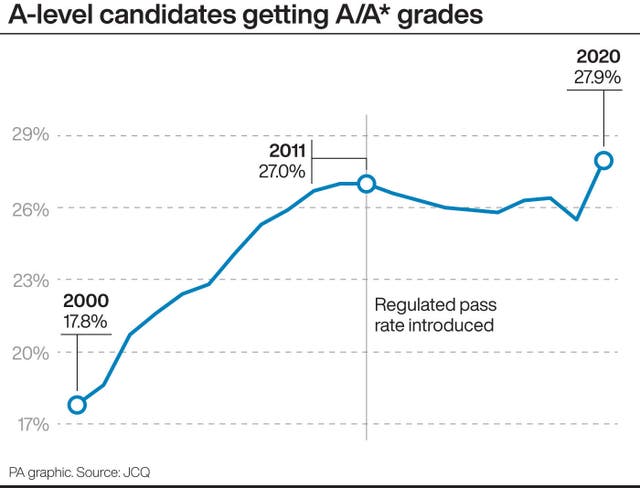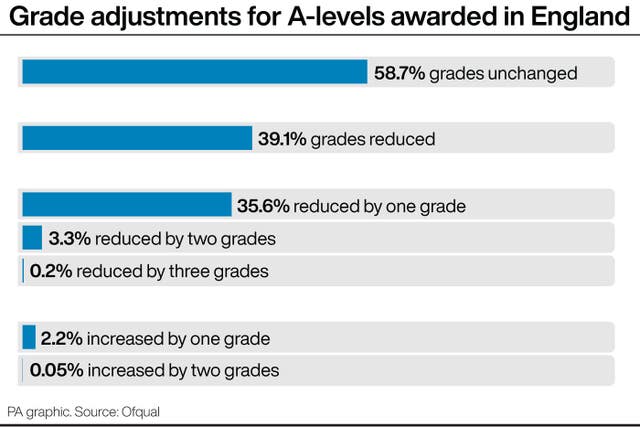A-level results: What next for students?
A breakdown of how this year’s results played out and what next steps students can consider.

After the release of this year’s A-level results for England, Wales and Northern Ireland, many students will be pondering their futures.
The disruption caused to the exam process by the coronavirus pandemic has led to much uncertainty across the education system.
Here is a breakdown of how this year’s results played out and what next steps students can consider:
What were results like this year?
According to the official data for England, Wales and Northern Ireland, there were some record results.
The proportion of entries awarded an A grade or higher rose to an all-time high of 27.9%, up by 2.4 points on last year.
Another record was seen in the overall pass rate (grades A* to E) which hit 98.3%, up from 97.6%.

But was it all good news for students?
No, thousands saw their results downgraded by a new moderation process introduced after the Covid-19 crisis caused exams to be cancelled.
Pupils received a calculated grade based on teachers submitting predicted marks alongside a rank order of students.
Ofqual data points to around 280,000 A-level entries in England being adjusted down from teachers’ original predictions.
How have people reacted?
The Association of School and College Leaders said it was very concerned about the “volatility” in results.
General secretary Geoff Barton said he had heard “heartbreaking” accounts from schools about grades being pulled down in an “utterly unfair and unfathomable” way.
One school head said she was “quite incensed” that some students would not now be able to go to the university of their choice after results were moderated down by as much as two grades.
Can unhappy students challenge their results?
In England, the Government has outlined a “triple lock” process that could help students boost their results.
This would allow a pupil to either accept their calculated grade, appeal to receive a valid mock result, or sit a new exam in the autumn.
How do appeals work?
In England, Northern Ireland and Wales, pupils can ask their school or college to check if an administrative error was made when they submitted their grade – and they can ask them to pursue an appeal if this happened.
But individual students cannot directly challenge their grades to the exam boards – it needs to be done by a school or college on their behalf.
The exception is in Wales where private candidates can make direct appeals to the exam board.
Ofqual previously said results can go to appeal if a school can show grades are lower than expected because previous cohorts are not “representative” of this year’s students.
The exam regulator said schools and colleges can appeal if they can prove historical data used to standardise grades is not a reliable indicator of this year’s results due to a change of circumstances.
For example, this could be because a school has had a “significant change in leadership or governance” or a “monumental event” such as flooding or fire.
Schools and colleges can also appeal if they believe they made an error when submitting a grade, or if it believes an exam board made a mistake.
Are there differences between nations?
In Scotland this week, protests by pupils resulted in the SNP government allowing results estimated by teachers to be accepted, after thousands of Higher marks were downgraded.
Education Secretary Gavin Williamson has ruled out making a similar U-turn in England.
In Wales, a different model is used to Scotland, with nearly half of a pupil’s final mark based on AS-levels completed last year.
The Welsh Government has expressed confidence that grades will be “robust” despite concerns that its model would mean pupils at schools which had historically not performed as well would be unfairly penalised.
In Northern Ireland, results are based on teachers’ predictions and statistical modelling.
Its exams body, the Council for the Curriculum, Examinations and Assessment, said students will have a broader scope to appeal against A-level and GCSE grades.
How do mock results come into play?
It is not yet fully clear.
Mr Williamson said Ofqual would be “issuing clarity” on how mock tests – held before schools were forced to close amid the pandemic – can form the basis of an appeal.
Ofqual indicated to reporters on Thursday that this may be by the start of next week, if not before.
The concern for students is how seriously they took mock tests.

How will exams work later this year?
The Government has said it will provide a support package to help schools cover the costs of running new exams in the autumn.
This includes booking venues, hiring invigilators and paying for exam fees if they exceed rebates given this summer.
Much will depend on how the pandemic plays out and whether further restrictions on social distancing or a re-tightened lockdown again affect exam plans.
How is this affecting university applications?
According to figures from university admissions service Ucas, more students have been accepted on UK degree courses this year.
A total of 358,860 applicants have been accepted – a 2.9% rise compared with 2019.
Out of these, 316,730 were accepted on their first choice, up 2.7% on the same point last year.
Ministers had urged universities to adopt a “flexible” approach to assessing applications, with institutions told to hold places for students pending the outcome of any appeal.
But exam boards will have less than four weeks to process appeals, with a Ucas deadline of September 7 for applicants to meet their academic offer conditions.
What about clearing?
So far, 7,600 people have found places through clearing this year.
Mr Williamson said a “late clearing process” is expected to be available for pupils taking A-level exams in the autumn.
He said discussions were being held with the university sector so students can possibly start university in January, rather than the usual September/October time.





